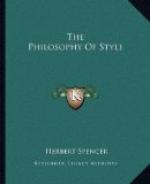10. This superiority of specific expressions is clearly due to a saving of the effort required to translate words into thoughts. As we do not think in generals but in particulars—as, whenever any class of things is referred to, we represent it to ourselves by calling to mind individual members of it; it follows that when an abstract word is used, the bearer or reader has to choose from his stock of images, one or more, by which he may figure to himself the genus mentioned. In doing this, some delay must arise some force be expended; and if, by employing a specific term, an appropriate image can be at once suggested, an economy is achieved, and a more vivid impression produced.
ii The Principle of Economy applied to Sentences.
11. Turning now from the choice of words to their sequence, we shall find the same general principle hold good. We have a priori reasons for believing that in every sentence there is some one order of words more effective than any other; and that this order is the one which presents the elements of the proposition in the succession in which they may be most readily put together. As in a narrative, the events should be stated in such sequence that the mind may not have to go backwards and forwards in order to rightly connect them; as in a group of sentences, the arrangement should be such, that each of them may be understood as it comes, without waiting for subsequent ones; so in every sentence, the sequence of words should be that which suggests the constituents of the thought in the order most convenient for the building up that thought. Duly to enforce this truth, and to prepare the way for applications of it, we must briefly inquire into the mental act by which the meaning of a series of words is apprehended.
12. We cannot more simply do this than by considering the proper collocation of the substantive and adjective. Is it better to place the adjective before the substantive, or the substantive before the adjective? Ought we to say with the French—un cheval noir; or to say as we do—a black horse? Probably, most persons of culture would decide that one order is as good as the other. Alive to the bias produced by habit, they would ascribe to that the preference they feel for our own form of expression. They would expect those educated in the use of the opposite form to have an equal preference for that. And thus they would conclude that neither of these instinctive judgments is of any worth. There is, however, a philosophical ground for deciding in favour of the English custom. If “a horse black”




